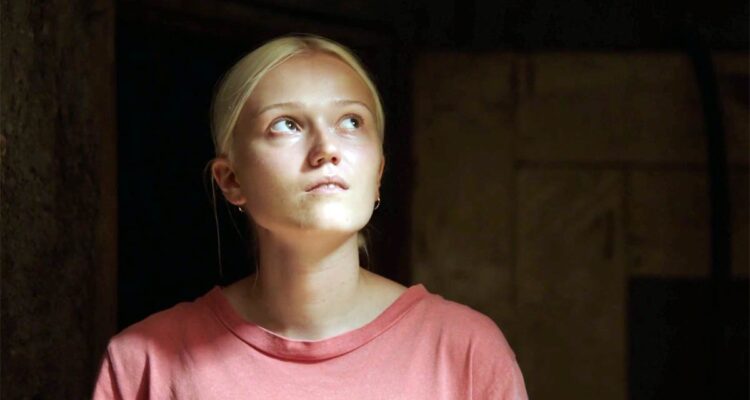Since the breakup of the Soviet Union and the loss of arts funding, the Lithuanian national cinema has struggled to make a dent in the Western festival circuit, though that may be changing. Trickle-down from venue-hunting international productions, more generous tax incentives, and co-production agreements have the potential to cultivate a new generation of filmmakers in the same kind of fertile dramatic soil from which, for instance, the Romanian New Wave was harvested: contested historical trauma and an ambivalent transition to the Eurozone. One such green shoot emerges in the form of “Pilgrims,” the promising first feature by Laurynas Bareisa, a smartly structured, professionally modulated drama about grief and personal and historical memory.
READ MORE: The 100 Most Anticipated Films Of 2022
We begin in Vilnius, the capital, where Indre (Gabija Bargailaite) meets up with Paulius (Giedrius Kiela) because his foot is in a cast and he needs someone to drive him out of the city for an important trip. She’s been living abroad, and they have some history together, which emerges in dribs and drabs as they travel to Lithuania’s second city, Kaunas, or more precisely to Karmėlava, the small town outside the city where the airport is. It was in this airport town where Matas, a young man close to both of them, was assaulted, abducted, and killed in a horrific random attack four years ago. Paulius wants to retrace Matas’ steps—to see it, to feel it, maybe to wallow in it. Thus the significance of the title: Paulius and the more outwardly reluctant Indre have come to contemplate the stations of the cross, to suffer as Matas suffered.
The 40-year-old Kiela is playing a character written as a decade younger, but his bowl-cut and petulant affect give him an innocence that plays off the younger Bargailaite’s familiar, closed-off exasperation and concern. Their dynamic—his shirt-rending masochistic self-pity and her hardened exterior and suggestive passivity—allows “Pilgrims” to escalate nicely, in its muted way, building to moments of dark humor before allowing Indre to emerge as the film’s true protagonist. Her revelations, once uttered, clarify the film’s knowing take on gender and the performance of grief, and in the conflicting impulses to stay or go which take on additional metaphorical weight in a country that, like much of post–Cold War Eastern Europe, is dealing with the brain-drain of EU migration.
As Paulius forces confrontations with witnesses and the perpetrator’s family, Bareisa has further casual narrative traps to spring, filling in the ways in which the townsfolk have their own connections to the violent past, and to each other. As an existential mystery about a solved murder, “Pilgrims” lacks the poetic expansiveness of “Once Upon a Time in Anatolia,” but it has a fair bit to say about complicity, remembering, and forgetting.
Bareisa’s previous shorts were inspired, he has said, by the banal backdrops of real crime reports—true crime with the crime left out. The film’s solid, unassuming technical qualities, featuring plenty of natural light on long Baltic summer evenings and no non-diegetic music, give it an uneasy quietude that contrasts effectively with the half-buried history. Bareisa is from around Kaunas, and knows, as many of his characters do, what happened on this field or under that bridge; watching “Pilgrims” you get a sense of people working toward an uneasy truce with the ghosts they live with. [B]

